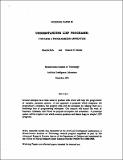| dc.contributor.author | Rich, Charles | |
| dc.contributor.author | Shrobe, Howard E. | |
| dc.date.accessioned | 2008-04-10T14:36:05Z | |
| dc.date.available | 2008-04-10T14:36:05Z | |
| dc.date.issued | 1974-12 | |
| dc.identifier.uri | http://hdl.handle.net/1721.1/41117 | |
| dc.description | Work reported herein was conducted at the Artificial Intelligence Laboratory, a Massachusetts Institute of Technology research program supported in part by the Advanced Research Projects Agency of the Department of Defense and monitored by the Office of Naval Research under Contract Number N00014-70-A-0362-0005. | en |
| dc.description.abstract | Several attempts have been made to produce tools which will help the programmer of complex computer systems. A new approach is proposed which integrates the programmer's intentions, the program code, and the comments, by relating them to a knowledge base of programming techniques. Our research will extend the work of Sussman, Goldstein, and Hewitt on program description and annotation. A prototype system will be implemented which answers questions and detects bug in simple LISP programs. | en |
| dc.description.sponsorship | MIT Artificial Intelligence Laboratory | en |
| dc.language.iso | en_US | en |
| dc.publisher | MIT Artificial Intelligence Laboratory | en |
| dc.relation.ispartofseries | MIT Artificial Intelligence Laboratory Working Papers, WP-82 | en |
| dc.title | Understanding LISP Programs: Towards a Programmer's Apprentice | en |
| dc.type | Working Paper | en |
